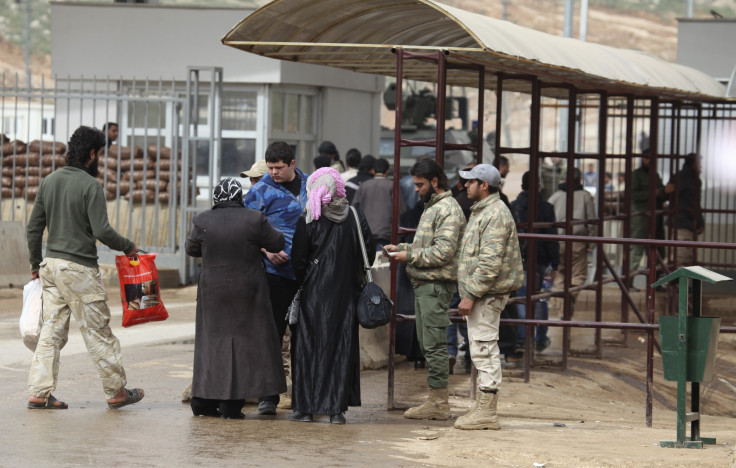Syrian Smugglers Say Turkish Buffer Zone At Border Will Not Help Fight Against ISIS

Syrian smugglers on the border of Turkey said Turkish President Recap Tayyip Erdogan's plan to create a buffer zone will not stop Islamic State foreign fighters, weapons and oil sold by the group, from crossing. The Sunni militant group has established a well-coordinated, covert system for crossing into Syria, they said, which purportedly includes the cooperation of some Turkish security officials on the border.
Syrians living in Antakya, Turkey, and working in the smuggling business said ISIS foreign fighters are now crossing illegally into Syria by crawling under fences and crossing a river near Hacipasa, Turkey. According to one source, who asked to remain anonymous for safety reasons, each ISIS group has recruiters and smugglers who facilitate the crossings for the foreign fighters.
Foreign fighters trying to enter Syria through Turkey avoid crossings controlled by Syrian regime forces, such as those south of Hatay province near Latakia, Barry Abdul Lattif, a Syrian activist, said.
Lattif said he "cannot understand the Turkish situation with ISIS," adding that the Turkish police who man some of the border crossings with Syria seem to coordinate with the militant group. Lattif said the Jarabalus border crossing on the Euphrates river is currently under control of ISIS on the Syrian side and is manned by the Turkish security forces on the other side. ISIS will often allow refugees fleeing Syria through the border crossing, and send them to the Turkish side to be received by security forces. The two groups coordinate the flow of Syrians in and out of the border crossing.
Erdogan said Monday that he was considering the creation of a buffer zone on the country's border with Syria. "The Turkish armed forces are working on this. If necessary, we will decide about the buffer zone," Erdogan said, according to the president's press office.
The news of a possible buffer zone comes after Turkish officials have said that they will not join the international coalition to fight ISIS. Turkey is reluctant to join the fight against the militant group because it is currently thought to be holding 49 Turkish nationals, including diplomats and children, and any military action taken against it could endanger their lives. The country is also already supporting nearly 850,000 refugees displaced by the Syrian civil war, and the government is wary of military action that might add more to that number.
Although Turkish military intervention in Syria would help the Obama administration carry out its strategy against ISIS, the U.S. needs Turkey, more than anything, to better control its border.
It is estimated that there are currently about 3,000 foreign fighters in Syria, most of whom are thought to have crossed into Syria via the Turkish border.
For almost a year, Lattif said, ISIS foreign fighters used the Bab al-Salama and Bab al-Hawa border crossings to enter Syria; both are legal border posts. As the group began to grow in strength in Syria, opposition rebels that controlled the border crossings -- who are now fighting with the Jabhat al-Islamiyya or Islamic Front, an enemy of ISIS -- began to limit entry to Syrians only, and caught several foreigners who were attempting to cross to join ISIS. With increased security at these border crossings, Lattif said, more ISIS fighters are heading to Jarabalus.
For ISIS, Turkey's border with Syria is the group's access point for everything it needs to reach its ultimate goal: creating an Islamic Caliphate. Not only are fighters crossing the border, but so are weapons and money needed to aid the militant group. That money comes in the form of oil revenue. According to a report by The New York Times, ISIS is transporting what oil it can seize in Iraq and Syria and selling it on the black market in Turkey.
With the southern border of Turkey contested by warring opposition factions and the Syrian regime, Turkey's ability to manage the area is in question. And any move to establish stronger control of the border area could instigate clashes and violence, risking the safety of the hundreds of thousands of refugees currently living in camps in the region.
© Copyright IBTimes 2024. All rights reserved.





















